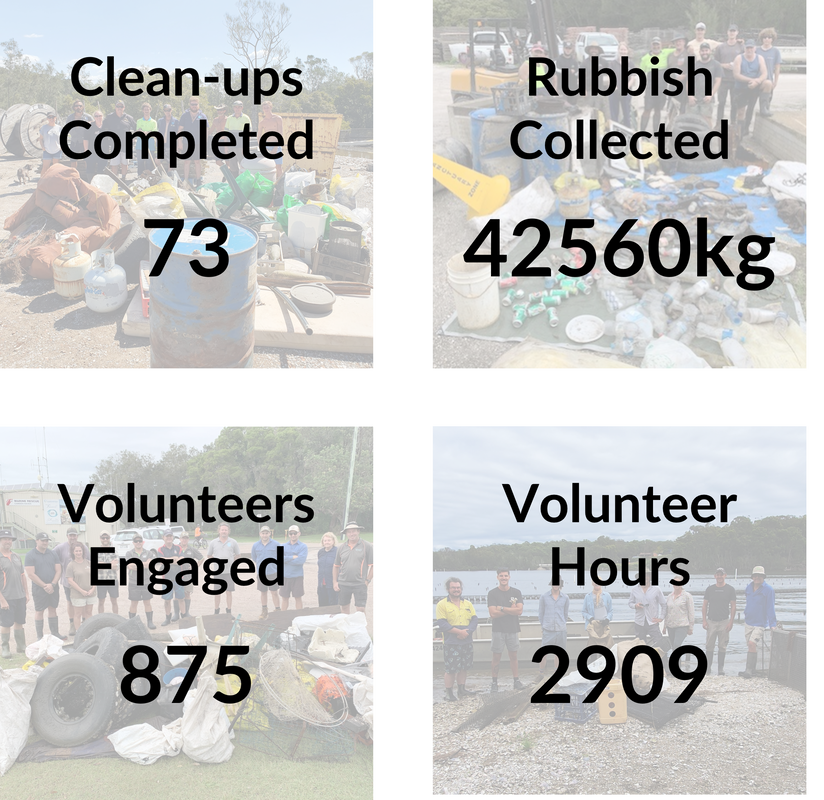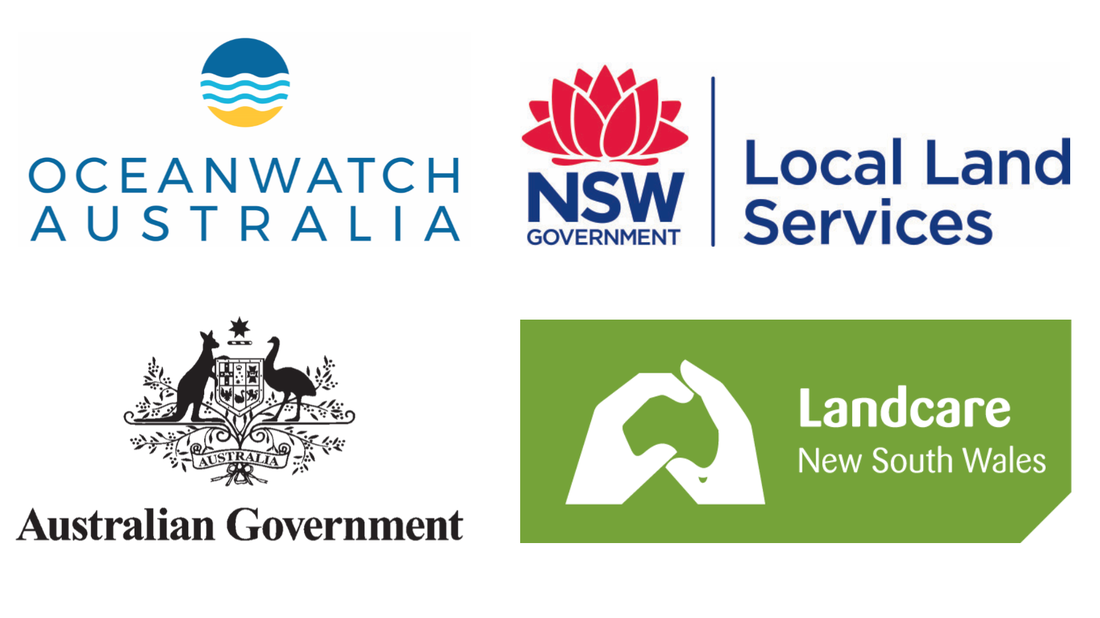Tide to Tip 2024
The following estuaries are confirmed for clean ups:
Tweed Heads - TBA
Nambucca River- 5 March
Macleay River- 6 March
Hastings River - 9 March
Camden Haven - 1 March
Manning River - 22 February
Wallis Lake - 21 February
Port Stephens - 20 February
Georges River - 15 February
Shoalhaven - 19 February
Jervis Bay - 8 March
Clyde River - 21 February
Tuross Lake - 22 February
Wagonga Inlet - 6 March
Nelson Lagoon - 14 February
Merimbula Lake - TBA
Pambula Lake - TBA
Wonboyn Lake - 16 February
We have commenced planning for our 5th annual Tide To Tip Clean-Ups and we are in the process of contacting potential local coordinators in each estuary to volunteer to help organise their estuary clean-up. Being a local coordinator is not hard. You will be the one communicating with OceanWatch staff around deciding on a suitable date and time for the event and will communicate this to your fellow oyster farmers in your estuary. OceanWatch will send you some paperwork (a volunteer agreement form, sign-up sheet for the volunteers on the day, a risk assessment JSA, and a clean-up kit). We will organise rubbish collection or tip vouchers with local councils and decide with you on the location of rubbish removal. On the day, you (with the help of an OceanWatch staff member) will give a basic safety briefing, get the volunteers to sign on and share the plan for the clean-up locations. Don't forget to take lots of pictures on the day and share them on social media #TideToTip #oysterindustrycleanup.
Now running in its fifth consecutive year, Tide to Tip sees oysters farmers from across NSW and interstate work together with local community groups to clean up their estuary and foreshore, removing tonnes of marine litter every year. Thank you to all the local coordinators who make this event possible and everyone who gives up their day to collect rubbish and keep our estuaries litter-free! You can still sign-up as a coordinator by getting in touch with us.
If you want to get involved, please email [email protected].
The following estuaries are confirmed for clean ups:
Tweed Heads - TBA
Nambucca River- 5 March
Macleay River- 6 March
Hastings River - 9 March
Camden Haven - 1 March
Manning River - 22 February
Wallis Lake - 21 February
Port Stephens - 20 February
Georges River - 15 February
Shoalhaven - 19 February
Jervis Bay - 8 March
Clyde River - 21 February
Tuross Lake - 22 February
Wagonga Inlet - 6 March
Nelson Lagoon - 14 February
Merimbula Lake - TBA
Pambula Lake - TBA
Wonboyn Lake - 16 February
We have commenced planning for our 5th annual Tide To Tip Clean-Ups and we are in the process of contacting potential local coordinators in each estuary to volunteer to help organise their estuary clean-up. Being a local coordinator is not hard. You will be the one communicating with OceanWatch staff around deciding on a suitable date and time for the event and will communicate this to your fellow oyster farmers in your estuary. OceanWatch will send you some paperwork (a volunteer agreement form, sign-up sheet for the volunteers on the day, a risk assessment JSA, and a clean-up kit). We will organise rubbish collection or tip vouchers with local councils and decide with you on the location of rubbish removal. On the day, you (with the help of an OceanWatch staff member) will give a basic safety briefing, get the volunteers to sign on and share the plan for the clean-up locations. Don't forget to take lots of pictures on the day and share them on social media #TideToTip #oysterindustrycleanup.
Now running in its fifth consecutive year, Tide to Tip sees oysters farmers from across NSW and interstate work together with local community groups to clean up their estuary and foreshore, removing tonnes of marine litter every year. Thank you to all the local coordinators who make this event possible and everyone who gives up their day to collect rubbish and keep our estuaries litter-free! You can still sign-up as a coordinator by getting in touch with us.
If you want to get involved, please email [email protected].
TIDE TO TIP - WATERWAY CLEAN-UP PROGRAM
CLEAN-UP GALLERY
BACKGROUND
Oysters are often called the canary in the coal-mine for estuary health, however it is oyster farmers who are truly the eyes and ears of the waterway. Out on their punts every day, these watermen have an intimate knowledge of their local environment and are often the first to report water pollution events and upstream disturbances. With the health of the environment intimately linked with their future income, they also have a vested interest to maintain and improve estuary condition.
For many years oyster farmers have supported community groups to undertake waterway clean-ups, volunteering their equipment and knowledge for the public good. Recognising the capacity of the oyster industry to undertake estuary clean-ups, in 2019 OceanWatch put forward a proposal to mobilise as many farmers as possible to undertake clean-ups in the same fortnight. The response was overwhelming with 240 oyster farmers across 4 states committing to participate in its inaugural year.
The model for a clean-up is easy to replicate and farmers can decide locally what specific day & time would work. Working in partnership with Clean-Up Australia Day, OceanWatch assists with the organisation of waste collection & disposal, provide rubbish bags, gloves, assists with insurance etc.
The initiative, dubbed ‘Tide to Tip’, has also seen oyster farmers partner with commercial fishermen, recreational fishermen, indigenous groups, schools and community groups to add on-ground capacity to the clean-ups. These partnerships have also help oyster farmers to build relationships and social licence with their local community.
The more growing regions we can get on board the better – it becomes a much better story, and one that demonstrates the value that the oyster industry places on a healthy environment. If you’d like your estuary or embayment to get involved please let me know on 0456935998 or email [email protected].
For many years oyster farmers have supported community groups to undertake waterway clean-ups, volunteering their equipment and knowledge for the public good. Recognising the capacity of the oyster industry to undertake estuary clean-ups, in 2019 OceanWatch put forward a proposal to mobilise as many farmers as possible to undertake clean-ups in the same fortnight. The response was overwhelming with 240 oyster farmers across 4 states committing to participate in its inaugural year.
The model for a clean-up is easy to replicate and farmers can decide locally what specific day & time would work. Working in partnership with Clean-Up Australia Day, OceanWatch assists with the organisation of waste collection & disposal, provide rubbish bags, gloves, assists with insurance etc.
The initiative, dubbed ‘Tide to Tip’, has also seen oyster farmers partner with commercial fishermen, recreational fishermen, indigenous groups, schools and community groups to add on-ground capacity to the clean-ups. These partnerships have also help oyster farmers to build relationships and social licence with their local community.
The more growing regions we can get on board the better – it becomes a much better story, and one that demonstrates the value that the oyster industry places on a healthy environment. If you’d like your estuary or embayment to get involved please let me know on 0456935998 or email [email protected].
INTRODUCTION & SAFETY VIDEO
Before commencing your clean-up, please:
- Watch the introduction & safety video below
- Read the safety sheet provided in the clean-up pack
- Sign-on as a volunteer
- Consider local conditions & risks, and discuss these with your clean-up coordinator
- Agree on areas to target, how you'll be splitting your resources and how long you'll be out
- Remember to sign-off when you finish up!
Clean-ups in South Australia & Tasmania are coordinated through state industry associations. Please contact the South Australian Oyster Growers Association and Oysters Tasmania for details of clean-ups in these states.
A massive thank you to all participating farmers and community group volunteers. A big thank you also to all partners and funders of this initiative.
The 2023 and 2024 Tide to Tip Clean Ups are jointly funded by the Australian & NSW Government’s Storm & Flood Industry Recovery Program.
The 2023 and 2024 Tide to Tip Clean Ups are jointly funded by the Australian & NSW Government’s Storm & Flood Industry Recovery Program.




